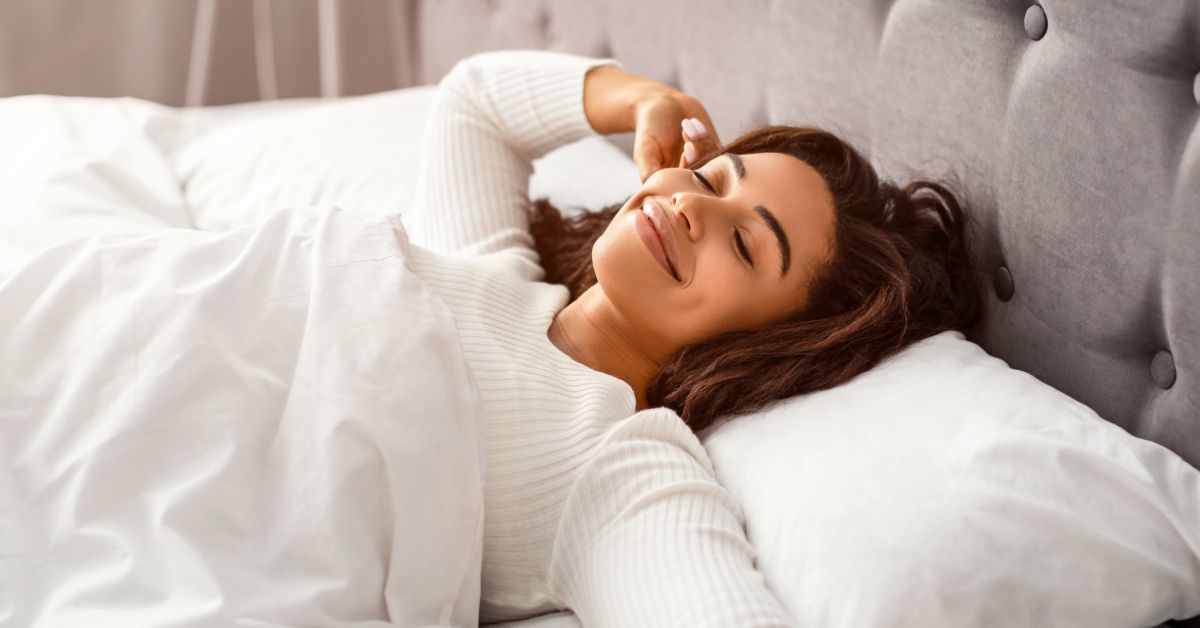The Importance of Restorative Sleep: How Circadian Rhythm, Sleep Hygiene, and GLP-1 Medications Impact Your Health
In today’s fast-paced world, sleep is often one of the first things we sacrifice in an attempt to squeeze more hours into the day. Whether it’s staying up late to finish work or waking up early to get a jump start on responsibilities, many people underestimate the vital power of sleep hygiene and restorative sleep. But what if we told you that sleep isn’t just about rest? It is one of the most essential pillars of overall health and wellness. When we don’t prioritize sleep, we miss out on its vital role in repairing, rejuvenating, and supporting the body’s natural processes.
Ivím Health understands that all aspects of your health are interconnected, with quality sleep being essential for maintaining overall well-being. Sleep is key to keeping your body in balance, and by understanding the science behind your circadian rhythm, you can improve your rest for better health.
Understanding the Importance of Sleep and Your Circadian Rhythm
Before exploring specific sleep tips, it’s important to understand the science behind sleep and the role of your circadian rhythm. This internal clock regulates when you feel awake and when you start to feel sleepy.
The circadian rhythm is your body’s internal clock that regulates when you feel awake and when you feel sleepy. This rhythm is influenced by factors such as light exposure, temperature, and even your lifestyle habits like meal timing and exercise patterns. When your circadian rhythm is out of sync, it can disrupt your sleep cycle, leading to poor sleep quality, daytime fatigue, and not feeling your best.
To help keep your circadian rhythm in check, it’s important to maintain a consistent sleep schedule. This involves maintaining the same sleep and wake schedule every day, even on weekends. By doing this, you can help regulate your sleep-wake cycle, ensuring that your body knows when it’s time to rest and when it’s time to be alert.
Another simple yet effective tip for keeping your circadian rhythm aligned is to expose yourself to natural sunlight within 30 minutes of waking up. Sunlight triggers a natural response in your brain, signaling that it’s time to be awake and alert. This early exposure to light helps set your circadian clock and prepares your body for restful sleep later in the day. In addition to natural light, grounding—spending time barefoot on natural surfaces like grass or sand—can help regulate your circadian rhythm and even increase melatonin levels, improving your sleep hygiene.
Ivím Health helps patients establish consistent habits that are crucial for creating a sustainable health plan, and this approach applies to sleep as well. Over time, a consistent schedule helps train your body to function at its best.
Sleep Hygiene and GLP-1 Medications: A Connection Worth Noting
While lifestyle factors such as stress, diet, and activity levels are often at the forefront of sleep conversations, certain medications can also play a role in influencing sleep patterns. For people who are using GLP-1 medications changes in sleep cycles are something to watch for. These medications can sometimes affect your sleep quality due to changes in appetite, energy levels, or other physiological effects.
If you notice disruptions in your sleep while using GLP-1 medications, it’s important to reach out to your Ivím Health provider. They can offer personalized guidance and help make any necessary adjustments to your treatment plan. Ivím Health’s membership offers a virtual, holistic approach, we ensure that your health journey, whether it’s related to sleep, weight management, or other wellness goals, is tailored to meet your unique needs.
How Much Sleep Do You Really Need?
A common question people have is, “How much sleep do I need?” The answer varies depending on several factors, such as age, lifestyle, and overall health. However, research shows that most adults require between 7 to 9 hours of sleep each night to function at their best. Sleep is a crucial time for your body to repair itself, but not all sleep is created equal. Two of the most important stages of sleep are deep sleep and REM sleep.
During deep sleep, your body repairs muscles, strengthens the immune system, and restores energy levels. Meanwhile, REM sleep plays a vital role in mental restoration, memory consolidation, and emotional well-being. The key to restorative sleep is not just the total number of hours, but the quality of those hours.
Each sleep cycle lasts about 90 minutes, and you typically go through several sleep cycles throughout the night. To fully benefit from each cycle, it’s important to stay in the deeper stages of sleep long enough to allow your body to repair itself properly. If you’re waking up feeling tired even after 7 or 8 hours of sleep, it may be because your sleep cycles are disrupted, and you may not be achieving the balance of REM and deep sleep needed for recovery.
Sleep Hygiene Tips for Better Sleep Quality
With the science of sleep in mind, let’s explore practical sleep hygiene tips that can help improve the quality of your rest:
- Create a Sleep-Friendly Environment: One of the most important factors in achieving a good night’s sleep is the environment where you sleep. Your bedroom should serve as a peaceful retreat, promoting rest and calm. Keep it dark, quiet, and cool. If light or noise is an issue, consider using blackout curtains and a white noise machine to block out disturbances. The ideal temperature for sleep is around 65°F (18°C), so adjusting your thermostat or using a fan can help you create an optimal sleeping environment.
- Limit Caffeine and Alcohol: Caffeine and alcohol can disrupt sleep quality. Drinking caffeine too late in the day can interfere with your ability to fall asleep due to its stimulating effects. To improve your sleep hygiene, limit caffeine intake at least 4-6 hours before bed. While alcohol may initially make you feel sleepy, it disrupts sleep later in the night, particularly during REM sleep. For optimal sleep, it’s best to avoid both alcohol and caffeine in the evening.
- Reduce Screen Time: The blue light emitted by phones, tablets, and computers can mess with your body’s natural sleep-wake cycle. To help your body prepare for sleep, it’s best to avoid screens for at least an hour before bed. Instead, engage in a relaxing activity like reading, stretching, or listening to calming music.
- Establish a Relaxing Bedtime Routine: A calming bedtime routine can signal to your body that it’s time to rest. Try incorporating calming essential oils such as lavender or chamomile to foster a relaxing environment. A warm bath or shower can also help. The cooling effect afterward triggers a natural drop in body temperature that promotes sleepiness.
- Consistency is Key: Go to bed and waking up at the same time each day, even on weekends. This helps regulate your sleep-wake cycle. This consistency is vital for ensuring that your body maintains a healthy rhythm.
Natural Sleep Aids and Meditation
If you’re having trouble falling asleep, there are several natural sleep remedies you can explore to promote relaxation and better sleep. Sleep meditation is one of the best ways to calm your mind and reduce anxiety before bed. You can use guided sleep meditations or simply focus on deep breathing exercises, such as the 4-7-8 method, breathe in for 4 seconds, hold for 7 seconds, and exhale for 8 seconds. This technique activates your parasympathetic nervous system, helping your body prepare for restful sleep.
In addition to meditation, natural sleep aids like chamomile tea are known to promote relaxation and improve sleep quality. Essential oils such as lavender and sandalwood are also renowned for their calming effects. Diffusing these oils in your bedroom can help create a peaceful environment that enhances your sleep.
Addressing Stress and Anxiety to Improve Sleep
Stress and sleep are deeply connected. When your mind is racing with worries, it becomes difficult to relax and fall into a deep, restorative sleep. To counteract this Ivím Health providers encourages incorporating relaxation techniques into your bedtime routine. Practices such as journaling, deep breathing, or visualization can help calm the mind and reduce stress levels.
Visualization techniques are particularly effective in helping to ease a restless mind. Picture yourself in a peaceful, familiar situation, whether walking in nature, sitting by a river, or lying on a beach, and immerse yourself in the sensory details of that scene. This shift in focus can help you relax and ease into sleep.
How GLP-1 Medications Affect Sleep Hygiene and Patterns
For individuals using GLP-1 medications as part of their wellness journey, it’s essential to monitor any changes in sleep patterns. While these medications support weight loss and metabolic health, some people may experience sleep disruptions as a side effect. If you notice any changes in your sleep, it’s important to reach out to your Ivím Health provider, who can adjust your treatment plan to ensure your health and sleep hygiene needs are met.
Sleep is a Foundation for Your Health Journey
Sleep is often referred to as the body’s “repair mode.” During sleep, your body works to repair muscles, consolidate memories, regulate hormones, and restore energy. Insufficient sleep has been linked to a range of health problems. Some include high blood sugar, hormonal imbalances, and increased stress levels.
Prioritize restorative sleep and your sleep hygiene as part of your wellness journey to improve both your physical and mental health. If you’re struggling with sleep during your weight loss journey, reach out to your Ivím Health provider for personalized guidance. Just like any other aspect of your health, sleep is integral to feeling your best, and we’re here to support you every step of the way.
Sources:
- National Institute of General Medical Sciences. “Circadian Rhythms.” National Institute of General Medical Sciences, U.S. Department of Health and Human Services, https://www.nigms.nih.gov/education/fact-sheets/Pages/circadian-rhythms.aspx.
- Marshall, Lisa. “Morning Light: The Key to Better Sleep.” WebMD, medically reviewed by Melinda Ratini, MS, DO, 23 Mar. 2022, www.webmd.com/sleep-disorders/features/morning-light-better-sleep.
- “How Much Sleep Do You Need?” National Heart, Lung, and Blood Institute, U.S. Department of Health and Human Services, www.nhlbi.nih.gov/health/sleep/how-much-sleep.
- Sleep Foundation. “Stages of Sleep.” Sleep Foundation, https://www.sleepfoundation.org/stages-of-sleep.
- Harvard Health Publishing. “Sleep Hygiene: Simple Practices for Better Rest.” Harvard Health, Harvard Medical School, https://www.health.harvard.edu/staying-healthy/sleep-hygiene-simple-practices-for-better-rest.
- “Meditation for Sleep.” Sleep Foundation, www.sleepfoundation.org/meditation-for-sleep.
- “Sleep and Stress Statistics.” NAPLAB, www.naplab.com/guides/sleep-stress-statistics/.


